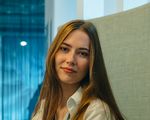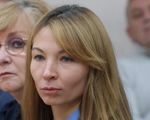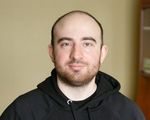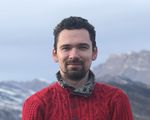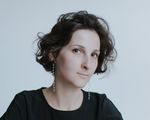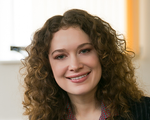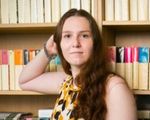About Success Builder
How do you find your place in life? How do you find something to do that both comes naturally to you and makes you happy? The answer is that you have to apply the knowledge you’ve gained from university and from life itself correctly. The Success Builder Project features HSE University graduates who have discovered themselves through an interesting business or an unexpected profession. The protagonists share their experiences and lessons learnt and talk about how they’ve made the most of the opportunities they were given.
Elena Ilyina successfully combined studies of management and law, which helps her in her current job at Rosatom. As the Director for State Support, she has gained interesting experience overseeing several different divisions. In this interview with Success Builder, Ms Ilyina explained what an innovative company and nuclear medicine are, how Rosatom works with scientists from universities, and why building a career at the company is not only easy, but also interesting.
What guided your choice of a university?
I chose HSE University first. Anyone headed for college, along with his or her parents, looks at a university’s reputation. At that time, HSE University was just making a name for itself. By the time I started there, it had become one of Russia’s top universities. It was new and considered one of the best and most interesting. It still had the feel of a successful experiment. I was interested in management and chose to study it. I didn’t know what I wanted to do after graduating. I just found it interesting and wanted to get as much practical knowledge as I could.
Management has greatly helped me determine my career path because I found that I was most comfortable among people who had studied management methods. Having a strong command of management enables you to make new choices at any point in your career. Management is so vast, so multifaceted that it is applicable everywhere. For example, when I went to work in the nuclear industry, I had no idea how I could apply my knowledge there. Graduates have such a stereotype, or perhaps fear, that something won’t work out. But in reality, I was able to easily apply all my knowledge.
Why did you study at the Military-Technical University at the same time?
I had applied to and been accepted by several universities, including the jurisprudence faculty of the Military-Technical School of the Russian Ministry of Defense. I was a devoted student; I always wanted to do the maximum and have more opportunities. I was a correspondence student in the jurisprudence faculty, so neither programme interfered with the other. In addition to my broad education in management, I decided to learn basic law, and this turned out to be a major bonus.
The workload at HSE University is quite heavy. How did you manage both?
I used the weekends, evenings, and nights. But I was lucky that the exam periods didn’t overlap. The education at HSE University is organised differently, with a modular system, so the two curricula blended smoothly. But I liked having that intensive load, so that I had to strive all the time to keep up with everything.
Do you use your legal knowledge in your current job?
It mostly gives me a deeper understanding of various aspects of the situation; it gives me a slightly different perspective on decision-making. A large number of both regulatory and managerial documents come to my desk, and it doesn’t hurt to sometimes highlight certain legal subtleties that are worth paying attention to.
When did you first try to apply your university education in a job?
My first job was a unique combination of managerial tasks that allowed me to test myself in many areas at once. For my first experience, I was lucky enough to get an internship at a Rosatom technical academy while I was studying for a master’s degree and writing my master’s thesis. One of my first serious tasks was to organise an off-site course as part of the cooperation between Rosatom and the Skolkovo MSM. I had to coordinate every aspect of the event, from administrative to social.
We completed the project and achieved the objectives, making the internship very productive and a real success. I had clearly demonstrated my best skills. I was then entrusted to lead a project on my own. It was an interesting task: working from scratch, I had to create a large in-house innovation community.
I got a great deal of pleasure from the fact that I was able to combine and carry out so many tasks. When I saw what I had accomplished with my own hands, I realised that my studies had not been in vain
We formed a community, looked for industry innovators, interacted with them, created an information resource, brought everything together on a single platform, and provided a platform for communicating on current projects and issues. I think the product turned out to be very interesting, although it took a long time to develop.
Do you think it’s good to combine work with studies?
It depends entirely on the person and the situation, how much energy and time they have and their goals. HSE University has strong programmes and, frankly, it was difficult for me to do both. It’s a stereotype that you have more free time during your master’s and can hold down a job as well. Traditionally, top master’s programmes all over the world don’t leave their students enough time for anything but studies, and this is fine. I should say that HSE University met us halfway by holding some of the courses in the evenings.
Why did you choose to get a master’s and how did you choose the programme?
I was driven by the thirst for knowledge and the choice of a programme was clear. I looked at two areas of focus within management—project management and marketing communications, and ultimately chose the latter. I wrote my undergraduate thesis on project management. I loved my teachers and the topic itself but I wanted to try something else—that’s just how I am. It was a new field for me in which I could discover something new and develop new interests and passions.
How did your master’s education change your approach to work? Did it enable you to systematise your knowledge? Did it help you as a specialist?
A master’s programme changes the way you think; you start looking at many things differently. The advantage in my case was that I studied a whole new field. This gave me a broader perspective and enabled me to look at tasks from different angles. What’s more, earning a master’s puts you in the company of new people—it’s good networking in terms of goals and professional connections. Studying in a master’s programme helped me a lot to improve my soft skills and it pushed me to take many important steps.
Why did you decide to stay on at Rosatom after your internship there?
I understood that I was in a huge company that holds significant status in Russia and the world, and that it has a major influence on the economy—especially because the nuclear sector is one of Russia’s key industries. That cannot but inspire a sense of responsibility and awe.
I started off organising many events. I had to immerse myself in scientific and technical questions because I genuinely wanted to figure out and understand what we were doing and why. This was an opportunity to familiarise myself with a huge company, to see how it works, to understand what innovations were. I was captivated by this and by the opportunities that my professional duties opened up to me. Rosatom is a unique structure where everything operates in a particular way.
What role do innovations play in the nuclear energy industry?
Innovation at Rosatom involves a constant search, adaptation, and implementation of new best practices, as well as the development of technologies and approaches. We were among the first to use Technology Readiness Levels. This approach enables you to evaluate how mature a technology is, how developed it is, what potential it has for the industry, and which elements need to be improved. The company now performs a technology readiness assessment to evaluate particular innovative products or technologies. This methodology makes it possible to diagnose ‘process R&D’ and, if necessary, modify the technical objective in a timely manner to reduce the risk of not achieving a measurable result.
Can you switch from one division to another at Rosatom? How is the company structured?
The Rosatom State Corporation is the largest corporation in Russia. It brings together more than 350 enterprises and organisations and employs more than 290,000 people. This makes both vertical and horizontal growth possible. In my career, I have moved between different divisions at Rosatom, thereby expanding my expertise and gaining new skills and experience. My first transition was to the Science and Innovations division where I worked on the implementation of scientific and technical projects. We held competitions for project proposals and created a unified sectorial thematic plan. In this way, we created the agenda for the further development of both projects and the company itself.
We worked with technological projects, selected the most promising ones for development, monitored their growth, evaluated them according to TRL methodology and prepared them to be scaled up. Then I received an offer to move to the medical division, to an integrator that collects Rosatom’s expertise in the field of healthcare. The division’s scientific work had not been developed sufficiently, so my task was to organise it and create a working mechanism. I was eager to try.
The advantage of Rosatom is that, although you move to other divisions—that are actually different organisations within the company—the transitions are very smooth and provide many new opportunities for growth.
The good thing is that you can adjust your career track at any time, choose a more interesting path and switch to a different company in the same industry
For example, I learned a lot in the scientific field and with the transition to medicine, there were new tasks to which I applied my experience. As a result, we built a completely innovative vertical process for working with scientific and innovative projects. We also managed to set up a scientific and technical council. Once again, I gained unique experience with the invitation to move to Rosenergoatom as Director for State Support. My duties in my previous job were very different, so it was something of a challenge to try something new, to see how I would cope with the responsibility and look at the results.
What is nuclear medicine?
This is medicine that uses nuclear industry technologies, including weakly radioactive substances, the so-called nuclides, for diagnostics (scintigraphy) and therapy (radiotherapy). But nuclear medicine is not limited to diagnostics and therapy using radioactive substances. This is a broader concept, a multidisciplinary field in which such sciences as chemistry, physics, biology and mechanics interact. One of the key projects that is being implemented in the organisation where I worked is the construction of a radiopharmaceutical plant in accordance with international GMP standards. The plant will produce a wide range of radiopharmaceuticals for internal and external consumption as well as active pharmaceutical ingredients. In addition, our company was engaged in the development, production and distribution of therapeutic and diagnostic equipment, as well as the construction of multifunctional processing centres for medical devices and food products—for example, for sterilising foods or preserving their properties.
What are your current duties at Rosenergoatom?
First of all, I am engaged in the planning, monitoring of implementation, formation and submission of reports on Russian Federation programme documents aimed at supporting the development of nuclear energy (including the state programme and the comprehensive programme of the Russian Federation).
The second large block of work is the decommissioning of heritage assets. These are nuclear facilities and those with hazardous radiation. These include nuclear power plants and various nuclear industry enterprises, as well as scientific organisations, institutes and medical institutions that used radiation sources and nuclear materials. Specifically, in our case we are talking about nuclear power plants. This is a very interesting area; no one has dealt with it before us. We are doing this for the first time, so we are studying and thinking about what changes should be made to federal laws concerning nuclear energy.
Another task is to work with the federal budget, ensure the prompt involvement of sources of state support in terms of federal radioactive waste and legacy power plants, as well as planning, monitoring performance and reporting.
How does the company develop its academic and expert potential?
Rosatom works closely with the Russian Academy of Sciences. In addition, it has a Scientific and Technical Council that was established in 2007 and that includes 12 sub-councils in various areas such as nuclear medicine, materials and technologies for nuclear engineering, ecology and radiation safety, digital technologies, etc.
The Council is a permanent advisory body that is made up of highly qualified experts, researchers, technologists, engineers, and world-class managers. When I came to the medical integrator, we created our own in-house council based on the the example of the Scientific and Technical Council. We needed expert advice on evaluating the results of the work. Our council included both doctors and scientists who work in university laboratories.
In addition, Rosatom has established a group of independent experts brought in from outside the company to support various areas. The company constantly works with universities and their laboratories, where, among other things, students are developing new materials. For example, when I worked at Science and Innovations, we were looking for and developing projects carried out either by young scientists or by teams of scientists from different universities and companies. Our scientific and technical council reviewed them and gauged how much domestic as well as foreign market demand there might be for the results of the scientists’ work.
Such expertise helped to ultimately develop a product that could be easily scaled and brought to market. These projects confirm the fact that collaboration between science and business is extremely important, and that such large companies as Rosatom are a bridge between laboratories and the market. The results of such work are the key to efficiency and the realisation of useful projects.
Does Rosatom cooperate with universities by recruiting and developing new personnel?
Naturally. We have a flagship university—the NRNU MEPI. In addition, Rosatom works closely with the Association of Higher Educational Institutions Consortium of Flagship Universities of the Rosatom State Atomic Energy Corporation. This is a community of higher educational institutions created to coordinate activities in the interests of the nuclear industry in the field of higher, postgraduate and continuing professional education, as well as in the scientific field.
Rosatom also participates in the life of two scientific and educational centres: the Ural Federal University and Nizhny Novgorod University. A new programme of advanced engineering schools has been launched, which we are implementing with various technical universities throughout Russia— the Tomsk Polytechnic University, Novosibirsk State Technical University, National University of Science and Technology (MISiS), and St. Petersburg Polytechnic University. We also support endowment funds at MISiS and MEPI. In addition, we are partners of the MSU Institute of Science and Technology and the MEPI in Obninsk.
In general, each division of Rosatom constantly holds activities, especially student competitions. The company invites students to internships and finances research, projects, and the creation of joint laboratories. In this sense, Rosatom is committed to education and is always open to cooperation with universities. This is a mutually beneficial exchange that results in unique expertise and initiatives that change our lives for the better.



